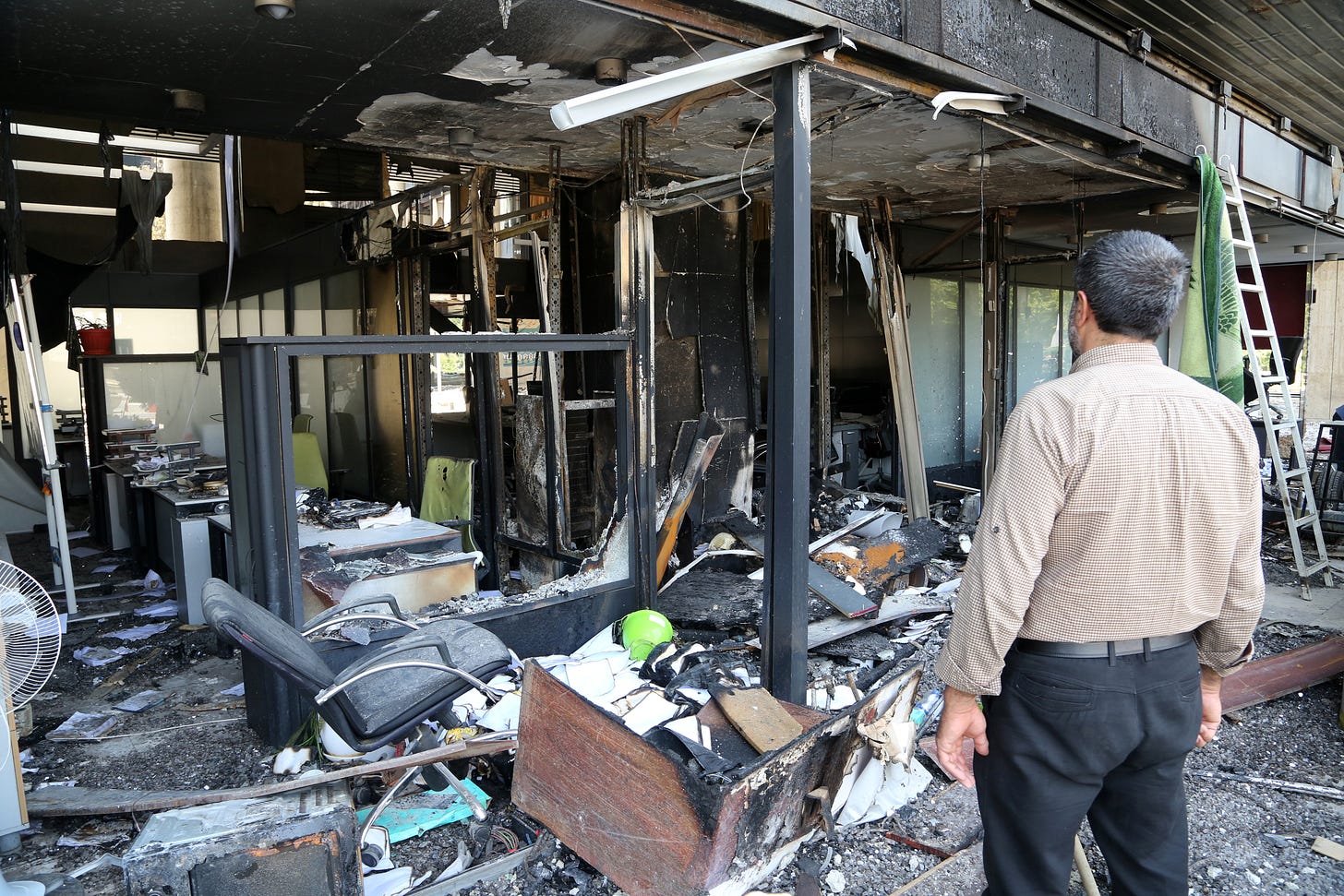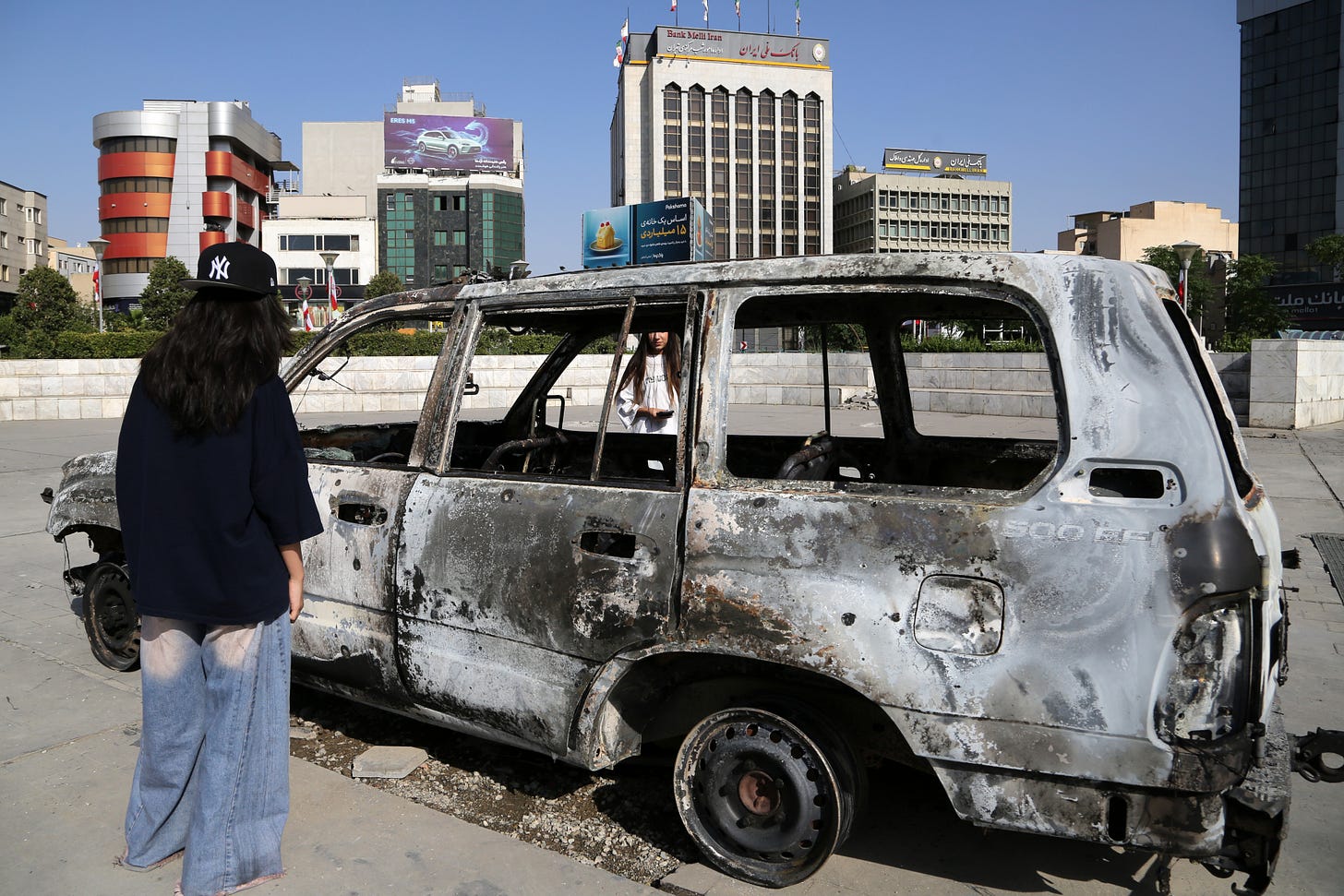Nations Are People
Do you deserve to die for your own bad government?
Nations have governments. Nations are full of people. The government and the people are two different things. The failure to take this distinction seriously lays the groundwork for much of the world’s suffering.
In China, teenagers shyly ask their crushes on dates. In Russia, families gather for a grandmother’s birthday party. In Yemen, harried mothers decide what to make for dinner. In Ukraine, men get excited for their favorite sports team. In Iran, kids dream about what they want to be when they grow up. A nation is a place where people live their lives. The people are just like you and me. This is the essence of what a nation is. This is the most important thing. This is the substance. Cultures may be foreign but people are the same everywhere. Your birth in one country rather than another is nothing but a flicker of randomness. When you are struggling to imagine what some news event might mean for people in a faraway place, ask yourself: If I was living there, how would I feel about it?
Nations also have governments. Some governments are better and some are worse. What is the relationship, morally speaking, between the government of a nation and its people? You already know the answer to this question. When the country in question is your own, you understand this distinction perfectly. If you live in America, your government is run by Donald Trump. Ugh. You might despise that guy. You might have worked hard against him during campaign season. When you visit another country, and tell them that you are American, you might add, “But don’t judge me!” You would not want to be branded with the weight of the various stupid and despicable actions of your own government. You understand, first, that you do not agree with those things, and second, that you as a regular person have little power to affect those things. You are just living your life. You want to be respected as a human being.
Unfortunately, this simple and intuitive understanding of the difference between the government and the people of your own country often evaporates—or gets erased—when the discussion turns to foreign countries. When someone says “Russia,” you probably think of Putin, not of the teenage girl dreaming of what she will do after graduation. When someone says “Iran,” you probably think of something that is often referred to as “the regime,” rather than of the laughing family gathering for a holiday meal. This mental mistake, this unwitting juxtaposition of one thing for a different thing, is like a steamroller that paves the way for you to accept unacceptable things. You would never nod sagely and agree that a bomb should be dropped on a child. But air strikes to “cripple” the “command and control” of a “hostile regime?” Well, of course, serious people understand that this may be necessary in the grand chessboard that is geopolitics.
Wars are waged against people. Yet we judge them by their impact on governments. This is a profound moral error. It causes you and your friends and neighbors, nice normal loving people, to countenance the most grotesque violence on earth with little more than a momentary shake of the head at “unfortunate civilian casualties.” Governments, of course, work to create this conflation of enemies in public opinion. We do not have to give into it, though. All it really takes to avoid this trap is to always hold in your mind a picture of people. The people in your own family, the people that you love, the people at your school, the people you work with, the people you see at the grocery store, the people at the Little League game, the people at your Christmas celebration. These are the same as the people who we decide to drop the bombs on in a different place. Borders are made up but people are real. If you imagine the violent killing of a person you know, nobody has to explain to you that this atrocity cannot possibly be justified by the machinations of faraway politicians that you have no influence over.

The point I am making here is very basic. It has been made countless times by countless people talking about countless wars in countless places. I hesitated even taking the time to reiterate something so basic, not wanting to waste anyone’s time. But then I watched the news yesterday. And I saw this same poisonous error, this same failure to think deeply or at all about what “Iran” really means, that seems to accompany every single American military assault on a foreign land. “I think progressives underestimate how dangerous Iran really is. Iran is not a normal country,” said Van Jones, a Respected and Humane Liberal, on CNN. “Normal countries don’t blind women because they show a little hair. They don’t empower little gangs of proxies to surround a country and fire rockets and rape people… they cannot have a bomb, because they say ‘Death to America,’ ‘Death to Israel,’ and ‘Death to all the Jews.’ One of those should offend you, if you’re a progressive. At least one should offend you.”
If you are a progressive, says Van Jones (a progressive), you should be offended by various policies of Iran’s government, and therefore you should accept the need to drop bombs on Iran. At no point on this smoothly paved highway to hell does Van Jones stop to marvel at his own mental transition between a nation’s people and its government. Nor does he stop to ask himself whether the proposition, “If a nation’s government and some of its people hold ideas that you disagree with, you should go to war with them” may be flawed. Nor does he end this speech by volunteering to have his own home blown up by Iranian soldiers as penance for the various detestable beliefs of the Trump administration. Odd.
The most respectable media outlets in America consistently fail the test of war. Their failure is all the more important because they are perceived as sober voices of conventional wisdom. The New York Times editorial board is concerned about following the process of Congressional authorization for war, more than the war itself. The Washington Post is miffed that “Trump did not prepare America for his war with Iran,” and demands, above all, that he do a better job explaining his goals. Every television news network yesterday spent hours discussing the minutiae of the specific bombs that were dropped, showing stock footage of the stealth bombers that dropped them, interspersed with maps of Iran with cartoon explosion graphics over various sites. War, as people experience it through the news, is a matter of proper strategy, a video game, a chess match between governments to be followed from afar, and critiqued tactically.
This is exactly wrong. The most important thing about war is what it does to people. It kills people and robs them of the right to live their lives. That is the news about war. Its tactical and strategic effects on various governments and on politics is a small point off to the side of this, important only in its relation to the other, more central matter of human beings. The way that war is covered, the way that we are all asked to ignore the most important things about it and focus solely on far more frivolous distractions, is like watching Hurricane Katrina drown New Orleans and saying, “We’re going to have nonstop coverage of how this will affect the NFL’s upcoming season.” If someone attacks you in the street and breaks your legs and puts you in the hospital and your friend hears the news and says, “Let’s talk about how this will affect Tuesday’s mayoral primary,” they would not be your friend very long. This is the media’s approach to war. Do not get swept away in its stream.
Are you willing to be killed for your own government’s sins? Are you willing to have your house destroyed and your child hit by shrapnel and your elderly parents lose access to medicine because of the policies of the latest president? If that seems unfair for you, it is unfair for anyone, anywhere. From this perspective, it is easy to see that the hurdle that a war must clear to be truly moral is so high that it stretches up into the clouds. Grounding ourselves in this perspective—always holding people, and their right to live, in the forefront of our minds—is the only way to make clear judgments about what our own government does with its killing machines. I’m sorry for writing a too-simple thing today. But every American flag graphic and blaring headline can make this a little harder to remember.
More
Related reading: The Point of Politics Is to Stop This; Young Morality and Old Morality; The Sin Eraser; Seeing Things For What They Are.
Gaza is the most shocking example of what can happen when nations pretend that people are not people. You can donate to Gaza relief here or here or here. Unfortunately, charity cannot solve political problems. Do your part to prevent bad government: If you are in NYC, remember to vote in the mayoral primary this week. Consider not ranking the disgraced, sexual harasser candidate who is backed by billionaires and engages routinely in lies and anti-Muslim smears.
Thank you for taking time out of your day to read How Things Work. This publication runs on a socialist funding model: It is free for anyone to read regardless of income. In exchange, I ask that if you are not destitute and can afford it and enjoy reading this site, you chip in and become a paid subscriber. In this way, we can keep on going and stay independent and free. It’s a model that has worked so far, thanks to readers like you. Subscriptions are just six bucks a month or sixty bucks for the whole year. We will survive and thrive together, my friends.



Your words have been a salve for me many times, but especially today as an Iranian — they mean a whole lot to me. Thank you Hamilton for your voice and your words, articulating much of what I’m struggling to put together in my grief.
What a fantastic article. Nothing is basic about this message. Such a profound and consequential moral error that leads to such suffering, but so easily avoided by understanding the difference, between government and nation.